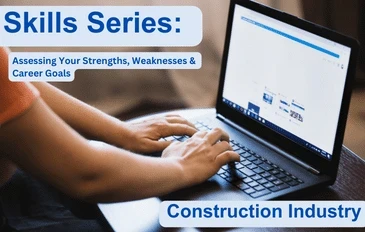
Skills Series: Identifying Your Strengths, Weaknesses, and Career Goals
In the construction industry, it’s essential to have a clear understanding of your skills and interests, as well as your career goals, before embarking on a job search. By taking the time to assess your strengths and weaknesses and identify your career aspirations, you’ll be better equipped to find a job that’s the right fit for you.
In this post, we will explore various strategies and techniques for assessing your skills and interests, including self-reflection, career assessments, and seeking feedback from others. We will also discuss how to identify your career goals and develop a plan for achieving them.
Self-reflection
Self-reflection is an essential component of assessing your skills and interests. Before starting your job search, take some time to reflect on your experiences, skills, and interests. By asking yourself some important questions, you’ll be better equipped to identify your strengths and areas for improvement.
One helpful exercise is to create a list of your skills and experience. This can include your educational background, relevant work experience, and any certifications or training you’ve received. As you create this list, think about the specific tasks you performed in each role and the skills you used to complete them.
You should also consider your personal interests and preferences when it comes to work. Think about the type of work environment you thrive in. Do you prefer working independently or as part of a team? Do you prefer a fast-paced or more relaxed work environment? By considering these factors, you’ll be able to identify roles and companies that align with your interests and preferences.
Another important aspect of self-reflection is identifying your strengths and weaknesses. This can be a difficult exercise, as many people are hesitant to acknowledge their weaknesses. However, it’s essential to have an accurate understanding of your strengths and areas for improvement in order to succeed in the construction industry.
To identify your strengths, think about the tasks or activities that come naturally to you. What are you good at? What do others frequently compliment you on? You can also consider your past experiences, both in the construction industry and in other areas of your life, to help identify your strengths.
To identify your areas for improvement, consider the tasks or activities that you struggle with. What areas do you feel you could use more training or experience in? You can also ask for feedback from others to help identify areas where you could improve.
Career assessments
Career assessments can be a valuable tool for assessing your skills and interests. These assessments can help you identify your strengths and interests, as well as potential career paths that may be a good fit for you.
There are various types of career assessments available, including personality tests, aptitude tests, and interest inventories. Personality tests, such as the Myers-Briggs Type Indicator, can help you understand your personality type and how it relates to different career paths. Aptitude tests, such as the Strong Interest Inventory, can help you identify your natural abilities and skills. Interest inventories, such as the Holland Code, can help you identify your interests and how they relate to different careers.
When taking a career assessment, it’s important to keep in mind that no assessment can fully capture your skills and interests. However, these assessments can provide valuable insight and help guide your career exploration.
Feedback from others
Seeking feedback from others can also be a useful way to assess your skills and interests. Talk to your colleagues, friends, and family members to get their perspective on your strengths and weaknesses. You can also consider asking for feedback from past employers or mentors in the construction industry.
When seeking feedback, it’s important to be open-minded and receptive to constructive criticism. Remember that feedback is intended to help you improve and grow, and that everyone has areas for improvement.
Michael DeSafey is a leading executive recruiter for professionals in the construction, engineering, and environmental industries. He is currently the President of Webuild Staffing: www.webuildstaffing.com. To learn more about Michael, or to follow his blog, please visit www.michaeldesafey.com.
Category: Career Training, Construction, Interview And Job Search Tips, Jobs, Resume Writing
